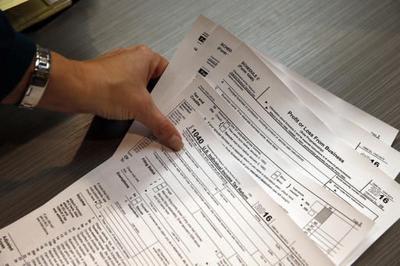Wisconsin Senate Majority Leader Devin LeMahieu on Thursday said he is poised to introduce legislation, potentially as soon as next week, that would shift Wisconsin from its current progressive personal income tax system to a flat tax.
LeMahieu, who floated preliminary details of the plan last month, said in an interview that the proposal would result in all Wisconsin taxpayers paying income taxes at a rate of 3.25% — below the state’s current bottom income tax rate of 3.54%.
LeMahieu said in a Thursday interview that his “goal is to give everybody a tax cut” using a portion of the state’s projected $6.6 billion budget surplus. The Oostburg Republican added that the plan would take effect over a four-year period.
Democratic Gov. Tony Evers, who would have final approval of any shift in the state’s tax policy, said in a recent interview that implementing a flat tax in Wisconsin is a “non-starter.”
“We prefer a progressive tax system that we have now,” Evers said.
Critics of flat taxes say they benefit the wealthiest taxpayers, while doing little to provide financial reprieve for low- and middle-income families.
Even still, LeMahieu is optimistic that a deal can be worked out. The majority leader noted that Illinois, a staunchly Democratic state, has a flat personal income tax and that in 2020, voters there rejected a constitutional amendment that would have allowed lawmakers to implement a progressive income tax system. He said this shows a flat tax can be supported by both parties.
“We’ll be willing to talk on a lot of things,” LeMahieu said when asked if he would be willing to meet the governor at a higher rate for a potential flat tax to work out a deal. “If I can get some of … the Senate Republicans’ objectives done, and we have to give on some areas, it would be, definitely, a change from the last four years.”
Asked whether the governor could see room for negotiation on LeMahieu’s flat tax proposal, Evers spokesperson Britt Cudaback referred to a proposal released in August 2022 that would offer a 10% tax cut for single filers earning $100,000 or less in annual adjusted gross income and married joint filers earning $150,000 or less.
Evers’ relationship with LeMahieu and Assembly Speaker Robin Vos, R-Rochester, was fraught during his first term. But both legislative leaders have met in private with the governor in recent weeks, something that had not happened for years prior.
The governor used his inaugural address on Tuesday to preach a message of renewed bipartisan cooperation among policymakers in Madison while simultaneously advocating for issues seen by GOP legislative leaders as non-starters.
Wisconsin’s tax burden — total tax revenues collected measured as a share of personal income — under its current progressive system fell to its lowest point in more than 50 years in 2022, according to a new report from the Wisconsin Policy Forum.
State and local governments took in 10.06% of Wisconsinites’ total personal income in the 2022 fiscal year (which ended on June 30) — down from 10.3% in 2021. That’s the smallest share in the records of the Forum and its predecessor, the Wisconsin Taxpayers Alliance, dating back to 1970.
The continued decline in the state’s tax burden comes on the heels of a $1 billion-per-year income tax cut in the 2021-23 state budget, along with longstanding state-imposed limits on local property tax increases.
Tax cuts and levy limits weren’t the only factors at play, though. Wisconsinites also saw a 6.7% boost in personal income in the 2021 calendar year. So while total tax collections increased by 4.1% from 2021 to 2022, that rate was outpaced by the growth in personal income.
While the state’s overall tax burden has decreased, relief has been disproportionate. A March 2022 Wisconsin Policy Forum report noted that average income tax rates have become more favorable to high- and middle-income residents and less favorable to those with lower income.
An October 2022 report, analyzing the most recent available U.S. Census data, found that Wisconsin’s tax burden was the 18th-highest in the nation in 2020.






